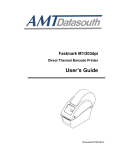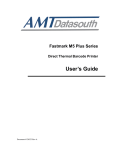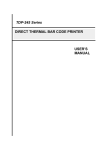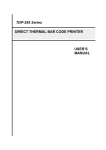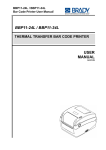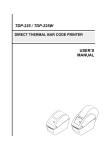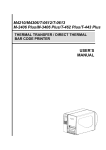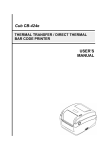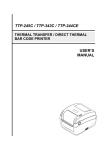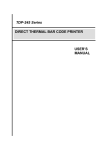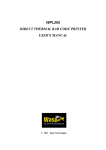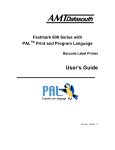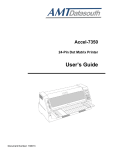Download AMT Datasouth Fastmark M5 Plus Series User`s guide
Transcript
Fastmark M5 Plus Series Thermal Transfer Barcode Printer User’s Guide Document #120522 Rev-A i Contents COMPLIANCES ............................................................................................... III 1. Introduction.........................................................................................1 2. Getting Started ....................................................................................1 2.1 Unpacking and Inspection............................................................1 2.2 Equipment Checklist.....................................................................1 2.3 Printer Parts...................................................................................3 3. Setup....................................................................................................4 3.1 Instructions to Top Cover Operation...........................................4 3.2 Setting Up the Printer ...................................................................6 3.3 Loading the Ribbon.......................................................................6 3.4 Loading Media Stock ....................................................................8 3.5 External Media Roll Mount Installation (Option).......................10 3.6 Peel-off Module Installation (Option).........................................12 3.6.1 Loading Labels into Peel-off Module ..................................15 3.7 Cutter Module Installation (Option) ...........................................17 3.7.1 Loading Media in Cutter Mode.............................................19 3.8 Diagnostic Tool ...........................................................................21 3.8.1 Start the Diagnostic Tool......................................................21 3.8.2 Printer Function (Calibrate, Ethernet, RTC setup…) .........22 3.9 Install Memory Card ....................................................................23 4. Power on Utilities..............................................................................24 4.1 Ribbon and Gap/Black Mark Sensor Calibration ......................24 4.2 Gap/Black Mark Calibration, Self-test and Dump Mode...........25 4.3 Printer Initialization .....................................................................28 4.4 Black Mark Sensor Setting and Calibration ..............................29 4.5 Gap Sensor Setting and Calibration ..........................................29 4.6 Skip AUTO.BAS ...........................................................................29 5. Maintenance ......................................................................................30 5.1 Cleaning .......................................................................................30 6. Troubleshooting................................................................................31 6.1 LED Status ...................................................................................31 6.2 Print Quality.................................................................................32 7. LED and Button Operation...............................................................34 7.1 LED ...............................................................................................34 7.2 Button Operation.........................................................................34 Revise History.......................................................................................38 Document #120522 Rev-A ii Copyright Declaration Information in this manual is subject to change without notice and does not represent a commitment on the part of AMT Datasouth Corporation. No part of this manual may be reproduced or transmitted in any form by any means, for any purpose other than the purchaser’s personal use, without the expressed written permission of AMT Datasouth Corporation. Compliances CE Class B: EN55022: 1998+A1: 2000+A2: 2003 EN55024: 1998+A1: 2001+A2: 2003 IEC 61000-4 Series EN61000-3-2: 2006 & EN61000-3-3: 1995+A1: 2001 FCC Part 15, Class B UL, CUL C-Tick: CFR 47, Part 15/CISPR 22 3rd Edition: 1997, Class B ANSI C63.4: 2003 Canadian ICES-003 TÜV-GS: EN60950: 2000 Wichtige Sicherheits-Hinweise 1. Bitte lesen Sie Diese Hinweis sorgfältig durch 2. Heben Sie diese Anleitung fűr den späteren Gebrauch auf. 3. Vor jedem Reinigen ist das Gerät vom Stromentz zu trennen. Verwenden Sie Keine Flűssig-oder Aerosolreiniger. Am besten eignet sich ein angefeuchtetes Tuch zur Reinigung. 4. Die Netzanschlußsteckdose soll nahe dem Gerät angebraucht und leicht zugänglich sein. 5. Das Gerät ist vor Feuchtigkeit zu schűtzen. 6. Bei der Aufstellung des Gerätes ist auf sicheren Stand zu achten. Ein Kippen oder Fallen könnte Beschädigungen hervorrufen. 7. Beáchten Sie beim Anschluß an das stromnetz die Anschlußwerte. 8. Dieses das Gerät kann bis zu einer Außentemperatur von maximal 40 betieben werden. Document #120522 Rev-A iii 1. Introduction Thank you for purchasing the AMT Datasouth M5 PLUS series Thermal Transfer and Direct Thermal Bar Code Printers. Although the printer takes only a small amount of space, it delivers reliable, superior performance. This printer provides both thermal transfer and direct thermal printing at user selectable speeds of: 2.0, 3.0, 4.0 or 5.0 inches per second (ips), for 203dots per inch (dpi) resolution. And 2.0 or 3.0 ips for 300dpi resolution. It accepts roll feed, die-cut, and fan-fold labels for both thermal transfer and direct thermal printing. All common bar codes formats are available. Fonts and bar codes can be printed in 4 directions, 8 different alphanumeric bitmap fonts and a build-in true type font capability. You will enjoy high throughput for printing labels with this printer. 2. Getting Started 2.1 Unpacking and Inspection This printer has been specially packaged to withstand damage during shipping. Please carefully inspect the packaging and printer upon opening and prior to installation. Please retain the packaging materials in case you need to reship the printer. 2.2 Equipment Checklist Printer User CD Disk (BarTender Ultralite, Printer User Manuals & Diagnostic Software) Quick start guide USB port cable External universal switching power supply Power Cord Label Spindle, fixing tab x2, 1.5” core adapter x2 Ribbon spindle x2 Ribbon rewind spindle paper core If any parts are missing, please contact the Customer Service Department of your purchased reseller or distributor. Document #120522 Rev-A 1 Optional Configurations Peel off module assembly. Guillotine cutter Full cut: Paper thickness: 0.06~ 0.19mm, 500,000 cuts Partial cut: Paper thickness: 0.06~0.12mm, 500,000 cuts Paper thickness: 0.19mm 200,000 cuts Main board integrated with internal Ethernet Internal Ethernet print server module Accessories KP-200 KU-007 plus External Ethernet print server External wireless (802.11b/g) print server External roll mount, media OD. 214 mm (8.4”) with 3” core label spindle Contact CCD contact scanner Long range linear image bar code scanner Document #120522 Rev-A 2 2.3 Printer Parts Clear Window Ribbon Access Cover LED Indicator Feed Button Printer Top Cover Top Cover Open Lever Fig. 1 Top front view 1. USB Interface 2. Centronics Interface 3. RS-232C DB-9 Interface 4. Power Jack 5. Power Switch 6 6. 2 1 3 4 5 Fig. 2 Rear view Document #120522 Rev-A 3 Rear Paper Guide 3. Setup 3.1 Instructions to Top Cover Operation Please take care when opening or closing the printer’s top cover by carefully following these instructions. To Open: 1. When facing the front of the printer pull the cover release levers on both sides of printer towards you. 2. Lift up the top gradually. There are two stop positions for the top cover. Position 1 and 2 are indicated on the label below. Note: To hold the cover open at position 1, you must lift the cover higher than the stopping point at position 1 and gently lower the cover to stop position 1. DO NOT free fall the top cover! 3. Fully open the top cover and gently lower it to stop position 2. Top cover support is fixed at position 2 4. To close the cover, lift up to the maximum angle and release. The cover will be kept at a stop position between 1 and 2 for a while. Use both hands to gently push down the top cover to close and make sure the cover is latched on both sides. Document #120522 Rev-A 4 Note: DO NOT place your hands or fingers between the top and lower cover while closing! Top cover is fully open and ready to close Use both hands to close the top cover 5. Do not force the cover! If you are not sure if the top cover is fixed at the stop position, please do not force the cover to close. Doing so may damage the cover and support arm. Please open the top cover to the maximum angle and close again. Use both hands to gently press the cover close. Document #120522 Rev-A 5 3.2 Setting Up the Printer 1. Place the printer on a flat, secure surface. 2. Make sure the power switch is off. 3. Connect the printer to the computer with the Centronics or USB cable. 4. Plug the power cord into the power supply connector at the rear of the printer, and then plug the power cord into a properly grounded receptacle. Plug USB Power Switch Power Cable Centronics RS-232C Power Supply Fig. 3 Attach power supply to printer 3.3 Loading the Ribbon The printer will detect if the ribbon is installed after turning the power on and it will set printing mode to thermal transfer or direct thermal printing mode automatically. If the printer does not detect the ribbon, the ribbon take up motor will be turned off. Document #120522 Rev-A 6 Make sure the printer top cover is engaged properly at both sides prior to powering up the printer. Please follow the steps below to install the ribbon into printer. 1. Push down on the ribbon access window to unlatch and open the cover. 2. Place a paper core onto the ribbon rewind spindle. 3. Mount the ribbon rewind paper core on the front hubs. 4. Install a ribbon on the ribbon supply spindle. 5. Mount the ribbon supply spindle on the rear hubs. 6. Thread the ribbon leader downward pass the print head. 7. Attach the ribbon leader to the ribbon rewind paper core by a piece of tape. 8. Rotate the ribbon rewind paper core until the ribbon leader is thoroughly encompassed by the black section of the ribbon. 9. Close the ribbon access window. Paper Core Ribbon Access Cover Ribbon Spindle Back Hub Front Hub Fig. 4 Ribbon installation (I) Document #120522 Rev-A 7 Ribbon supply spindle Ribbon Leader Rear Hub Ribbon Rewind Spindle with Paper Core Fig. 5 Ribbon installation (II) 3.4 Loading Media Stock 1. Insert spindle into a media roll (If your media core is 1 inch, remove the 1.5 inch core adapter from the fixing tab). If label width is 4 inch wide, two fixing tabs are not required). 1.5” Core Paper Roll Adapter* Fixed Tab Printing Side Face Up 1” Media Spindle Fig. 6 Label Roll installation (I) Document #120522 Rev-A 8 2. Open the printer’s top cover by releasing the green levers located on each side of the printer and lifting the top cover. A top cover support at the rear of the printer will hold the cover open. Lower Cover Fig. 7 Pull the lever to open the cover 3. Place a roll of media onto the internal Media Spindle. 4. Feed the media (printing side face up) under the Teflon bar and through the support guides. The media should come to rest outside the printer. Refer to Fig #8. 5. Adjust the green center-biased media guides to slightly touch the edges of the media/backing. 6. To close the printer top cover, lift the cover to the maximum open angle then use both hands to close the cover gently. Close the printer top cover slowly and make sure the cover latches securely. Note: 1. Make sure your hands or fingers are not placed between printer top and lower cover when closing. 2. Do not free fall the top cover. 3. Failure to securely close and lock the cover will result in poor print quality. Document #120522 Rev-A 9 Printer Top Cover Top Cover Support Paper Roll Mount Teflon Bar Media Guide Top Cover Open Lever Fig. 8 Media installation (II) 3.5 External Media Roll Mount Installation (Option) 1. Attach an external media roll mount on the bottom of the printer. Fig. 9 Attach the external roll mount to the printer 2. Open the printer top cover by releasing the top cover open levers. The top cover support will hold the cover open. 3. Install a roll of media on the external roll mount. 4. Feed the media (printing side face up) into the external opening located at the rear of the printer and then through the media guides. Document #120522 Rev-A 10 External Paper Roll Mount External Media Feed Opening Fig. 10 External roll mount media installation (I) 5. Continue feeding the media through the internal printer guides and place it on top of the platen. 6. Adjust the media guides to fit the appropriate width. 7. Close the printer top cover by lifting to the maximum open angle then push down the top cover gently. Rear Media Guide Top Cover Support Arm Media Guide Platen Fig. 11 External roll mount media installation (II) Document #120522 Rev-A 11 3.6 Peel-off Module Installation (Option) 1. Open the top cover and remove the front panel from the printer. Front Panel Fig. 12 Remove the front panel 2. Lift and hold the top cover while pushing down and sliding the cover support arm backwards to release. 3. Use a screwdriver to remove 6 screws on the lower inner cover. Top Cover Top Cover Support Arm Screws Flute Lower Inner Cover Screws Lower Cover Fig. 13 Remove 6 screws from lower inner cover Document #120522 Rev-A 12 4. Turn over the printer. Remove two screws located near the top cover hinge, and remove one screw at memory card cover. 5. Separate the top, inner, and the lower cover. 6. Thread the sensor cable through the bezel. Connect the peel-off panel cable to the 5-pin socket on printer PCB. PCB 5-pin Socket Peel-off panel Cable Peel-off panel Mounting Tabs Fig. 14 Connect peel-off sensor cable to main board Bezel Slot Fig. 15 Peel-off sensor cable installation Document #120522 Rev-A 13 7. Insert the peel-off assembly tabs into the lower inner cover hinge holes until they snap into place. Lower Inner Cover Roller Lower Cover Peel Off Assembly Tab Inner Hinge Holes Fig. 16 Peel-off panel installation (I) 8. Reassemble parts in reverse procedures after installing the module. Peel-off panel Roller Fig. 17 Peel-off panel installation (II) 9. Lift up the peel-off panel and snap into place to close. 10. Use a screwdriver to secure enclosure cover screws (9-places). 11. Close the top cover by placing the support arm back into the flute and then push down the top cover gently. Document #120522 Rev-A 14 3.6.1 Loading Labels into Peel-off Module Note: Both thermal paper and plain paper labels apply for peel-off function, neither PVC nor vinyl work with peel-off function. 1. Insert a 1” label spindle into a label roll. 2. Open the printer top cover by pulling the top cover open levers. The top cover support will hold the printer top cover. Peel-off panel Backing paper Top Cover Open Lever Opening Fig. 18 Open the top cover 3. Install the label roll onto the paper roll mount. 4. Open the peel-off panel by pulling it forward. Peel-off panel Fig. 19 Open the peel-off panel Document #120522 Rev-A 15 5. Feed the label, printing side facing up, through the paper guides and place it on top of the platen. 6. Thread the label through the liner opening, which is beneath the roller and tear off one piece of the label. 7. Adjust the paper guides by moving left or right to fit the label/backing width. Top Cover Top Cover Support Roller Peel-off panel Fig. 20 Load label into peeler roller assembly 8. Lift the peel-off panel up and back into the closed position. 9. Close the top cover by lifting up the top cover support and close the top cover slowly. Note: Pull the label outward removing slack after closing the top cover. Fig. 21 Complete label installation for peel-off mode Document #120522 Rev-A 16 3.7 Cutter Module Installation (Option) 1. Pull the top cover open levers to open the top cover. 2. Remove the front panel from the lower cover. Lower Cover Fig. 22 Pull the lever to open the cover 3. Lift and hold the top cover while pushing down and sliding the cover support arm backwards to release. 4. Use a screwdriver to remove 6 screws on the lower inner cover. Top Cover Top Cover Support Screws Flute Front Panel Lower Inner Cover Lower Cover Screws Fig. 23 Remove 6 screws from lower inner cover Document #120522 Rev-A 17 5. Turn over the printer. Remove two screws located near the top cover hinge. 6. Remove the screw from the memory card cover, and left the cover off. Plug in the cutter driver IC at U14 (M5) / U30 (M5 PLUS) socket on the main board. 7. Use both thumbs to hold the lower cover and index fingers to lift up the top cover open levers to separate the lower inner cover and the lower cover. 8. Thread the cable through the bezel. Connect the cutter module cable to the 4-pin socket on printer PCB. PCB 4-pin Socket Cutter Cable Cutter Fig. 24 Cutter module installation Lower Inner Cover Cutter Cable Lower Cover Bezel Fig. 25 Cutter module cable arrangement Document #120522 Rev-A 18 9. Assemble the lower inner cover back onto the lower cover. 10. Install the cutter into the slots of the printer inner cover. Cutter Slot Fig. 26 Cutter module installation 11. Use a screwdriver to secure enclosure cover screws (9-places). 12. Close the top cover by placing the top cover support arm back into the flute and push it forward, then close the top cover slowly. 3.7.1 Loading Media in Cutter Mode 1. 2. 3. 4. Insert media spindle into a roll. Open the printer top. Install a media roll onto the roll mount. Thread the media, printing side face up, through the guides, platen and cutter module outlet. 5. Lead the media through the cutter front opening. 6. Adjust the media guides by moving left or right to fit the media/backing width. Document #120522 Rev-A 19 Top Cover Top Cover Support Arm Paper Guide Platen Cutter Fig. 27 Media installation in cutter mode 7. Close the top cover by lifting upward to the maximum open position, then close slowly. Fig. 28 Complete media installation in cutter mode Document #120522 Rev-A 20 3.8 Diagnostic Tool The Diagnostic Utility is a toolbox that allows users to explore the printer's settings and status; change printer settings; download graphics, fonts, and firmware; create printer bitmap fonts; and to send additional commands to the printer. Using this convenient tool, you can explore the printer status and settings and troubleshoot the printer. Note: This utility works with printer firmware V6.00 and later versions. 3.8.1 Start the Diagnostic Tool 1. Double click on the Diagnostic tool icon to start the software. 2. There are four features (Printer Configuration, File Manager, Bitmap Font Manager, Command Tool) included in the Diagnostic utility. Document #120522 Rev-A 21 3.8.2 Printer Function (Calibrate, Ethernet, RTC setup…) 1. Select the PC interface connected with bar code printer. 2. Click the “Function” button to setting. 3. The detail functions in the Printer Function Group are listed as below. Function Description Factory Default Initialize the printer and restore the settings to factory default. Dump Text To activate the printer dump mode. Configuration Page Print printer configuration. Synchronize printer Real Time Clock with RTC Setup PC. Calibrate Sensor Calibrate the sensor specified in the Printer Setup group media sensor field. Reset Printer Reboot the printer. Print Test Page Print a test page. Ignore AUTO.BAS Ignore the downloaded AUTO.BAS program. Setup the IP address, subnet mask, gateway for the on board Ethernet. Ethernet Setup Note: For more information about Diagnostic Tool, please refer to the diagnostic utility quick start guide in the CD disk \ Utilities directory. Document #120522 Rev-A 22 3.9 Install Memory Card 1. Turn the printer upside down. 2. Remove the screw that fixes the memory card cover. Screw Memory Card Cover 3. Plug in the memory card on main board. M5 Model (Option) 4. M5 PLUS Model (SD Card) Close the memory card cover. * Recommended SD card specification. SD V 1.0, V 1.1 128MB SD V 2.0 (SDHC) 4GB class 6 256MB 512MB 1GB -Supported DOS FAT file system. -Folders stored on the SD card should be in the 8.3 filename format. -Approved SD card manufacturer: SanDisk, Transcend. Document #120522 Rev-A 23 4. Power on Utilities There are six power-on utilities to set up and test printer hardware. These utilities are activated by pressing FEED button and by turning on the printer power simultaneously. The utilities are listed as below: 1. Ribbon sensor calibration and Gap or black mark sensor calibration 2. Gap/black mark sensor calibration, Self-test and dump mode 3. Printer initialization 4. Set black mark sensor as media sensor and calibrate the black mark sensor 5. Set gap sensor as media sensor and calibrate the gap sensor 6. Skip AUTO.BAS 4.1 Ribbon and Gap/Black Mark Sensor Calibration Gap/black mark sensor sensitivity should be calibrated at the following conditions: 1. A brand new printer 2. Change label stock. 3. Printer initialization. Please follow the steps below to calibrate the ribbon and gap/black mark sensor. 1. Turn off the power switch. 2. Hold on the button then turn on the power switch. 3 Release the button when LED becomes red and blinking. (Any red will do during the 5 blinks). It will calibrate the ribbon sensor and gap/black mark sensor sensitivity. The LED color will be changed in the following order Amber red (5 blinks) amber (5 blinks) green (5 blinks) green/amber (5 blinks) red/amber (5 blinks) solid green Note: Please select gap or black mark sensor by sending GAP or BLINE command to printer prior to calibrate the sensor. For more information about GAP and BLINE command, please refer to programming manual. Document #120522 Rev-A 24 4.2 Gap/Black Mark Calibration, Self-test and Dump Mode While calibrate the gap/black mark sensor, printer will measure the label length, print the internal configuration (self-test) on label and then enter the dump mode. To calibrate gap or black mark sensor, depends on the sensor setting in the last print job. Please follow the steps below to calibrate the sensor. 1.Turn off the power switch. 2. Hold on the button then turn on the power switch. 3. Release the button when LED becomes amber and blinking. (Any amber will do during the 5 blinks). The LED color will be changed in the following order. Amber red (5 blinks) amber (5 blinks) green (5 blinks) green/amber (5 blinks) red/amber (5 blinks) solid green 4. It calibrates the sensor and measures the label length and prints internal settings then enter the dump mode. Note: Please select gap or black mark sensor by Diagnostic tool or by GAP or BLINE command prior to calibrate the sensor. For more information about GAP and BLINE command, please refer to programming manual. Document #120522 Rev-A 25 Self-test Printer will print the printer configuration after gap/black mark sensor calibration. Self-test printout can be used to check if there is any dot damage on the heater element, printer configurations and available memory space. Self-test printout Print head check pattern Model name and F/W version Printed mileage (meter) Firmware checksum Serial port configuration Code page Country code Print speed (inch/sec) Print darkness Label size (inch) Gap distance (inch) Gap/black mark sensor sensitivity Numbers of download files Total & available memory space Note: 1. The physical flash memory for RoHS compliant version is 2MB Flash and 2MB DRAM (M5 Model) / 8MB SDRAM (M5 PLUS Model) 2. System occupies 960 KB in Flash memory so total flash memory space for user downloading is 1088 KB 3. System occupies 1792 KB in DRAM so total DRAM memory space for user downloading is 256 KB (M5 Model) 4. System occupies 7936 KB in SDRAM so total SDRAM memory space for user downloading is 256 KB (M5 PLUS Model) Document #120522 Rev-A 26 Dump mode The printer will enter dump mode after printing the printer configuration. In the dump mode, all characters will be printed in 2 columns as following. The left side characters are received from your system and right side data are the corresponding hexadecimal value of the characters. It allows users or engineers to verify and debug the program. ASCII Data Hex decimal data related to left column of ASCII data Fig. 30 Dump mode printout Note: Turn the printer power OFF and back ON to resume normal printing. Document #120522 Rev-A 27 4.3 Printer Initialization Printer initialization is used to clear DRAM and restore printer settings to defaults. The only one exception is ribbon sensitivity, which will note be restored to default. Printer initialization is activated by the following procedures. 1. Turn off the power switch. 2. Hold on the button then turn on the power switch. 3. Release the button when LED turns green after 5 amber blinks. (Any green will do during the 5 blinks). The LED color will be changed in the following: Amber red (5 blinks) green/amber (5 blinks) amber (5 blinks) green (5 blinks) red/amber (5 blinks) solid green Printer configuration will be restore to defaults as below after initialization. Parameter Default setting Speed 203DPI :127 mm/sec (5 ips) 300DPI: 76 mm/sec (3 ips) Density 8 Label Width 4” (101.6 mm) Label Height 4” (101.6 mm) Sensor Type Gap sensor Gap Setting 0.12” (3.0 mm) Print Direction 0 Reference Point 0,0 (upper left corner) Offset 0 Tear Mode On Peel off Mode Off Cutter Mode Off Serial Port Settings 9600 bps, none parity, 8 data bits, 1 stop bit Code Page 850 Country Code 001 Clear Flash Memory No IP Address DHCP Note: Always do gap/black mark sensor calibration after printer initialization. Document #120522 Rev-A 28 4.4 Black Mark Sensor Setting and Calibration Please follow the steps as below. 1. Turn off the power switch. 2. Hold on the button then turn on the power switch. 3. Release the button when LED turns green/amber after 5 green blinks. (Any green/amber will do during the 5 blinks). The LED color will be changed as following: Amber red (5 blinks) amber (5 blinks) green (5 blinks) green/amber (5 blinks) red/amber (5 blinks) solid green 4.5 Gap Sensor Setting and Calibration Please follow the steps as below. 1. Turn off the power switch. 2. Hold on the button then turn on the power switch. 3. Release the button when LED turns red/amber after 5 green/amber blinks. (Any red/amber will do during the 5 blinks). The LED color will be changed in the following: Amber red (5 blinks) amber (5 blinks) green (5 blinks) green/amber (5 blinks) red/amber (5 blinks) solid green 4.6 Skip PAL application program PAL programming language allows user to download an auto execution file to flash memory. The printer will run the PAL application program immediately when turning on printer power. The PAL application program can be interrupted by the power-on utility. Please follow the procedures below to skip a PAL application program: 1. Turn off printer power. 2. Press the FEED button and then turn on power. Document #120522 Rev-A 29 3. Release the FEED button when LED becomes solid green. The LED color will be changed in the following: Amber red (5 blinks) amber (5 blinks) green (5 blinks) green/amber (5 blinks) red/amber (5 blinks) solid green 4. Printer will be interrupted to run the PAL application program. 5. Maintenance 5.1 Cleaning This session presents the cleaning tools and methods to maintain your printer. 1. Please use one of following material to clean the printer. Cotton swab (Head cleaner pen) Lint-free cloth Vacuum / Blower brush 100% ethanol 2. The cleaning process is described as following Printer Part Method Interval 1. Always turn off the printer Clean the print head when before cleaning the print head. changing a new label roll 2. Allow the print head to cool for a minimum of one minute. 3. Use a cotton swab (Head cleaner pen) and 100% ethanol to clean the print head surface. Print Head 1. Turn the power off. Platen Roller 2. Rotate the platen roller and wipe it thoroughly with 100% Document #120522 Rev-A 30 Clean the platen roller when changing a new label roll ethanol and a cotton swab, or lint-free cloth. Tear Bar/Peel Use the lint-free cloth with 100% As needed ethanol to wipe it. Bar Sensor Compressed air or vacuum Monthly Exterior Wipe it with water-dampened cloth As needed Interior Brush or vacuum As needed Note: Do not touch print head by hand. Should it be touch accidentally, please use ethanol to clean it. Please use 100% Ethanol. DO NOT use medical alcohol, which may damage the printer head. Regularly clean the print head and supply sensors to maintain printer performance and extend print life (suggest cleaning when installing a new ribbon). 6. Troubleshooting The following guide lists the most common problems that may be encountered when operating this bar code printer. If the printer still does not function after all suggested solutions have been invoked, please contact the Customer Service Department of your purchased reseller or distributor for assistance. 6.1 LED Status This section lists the common problems that according to the LED status and other problems you may encounter when operating the printer. Also, it provides solutions. LED Status / Color Printer Status Possible Cause OFF No response No power Recovery Procedure * Turn on the power switch. * Check if the green LED is lit on power supply. If it is not lit on, power supply is broken. * Check both power connections from the power cord to the power supply Document #120522 Rev-A 31 and from the power supply to the printer power jack if they are connected securely. Solid Green ON The printer is ready * No action necessary. to use Green with Pause blinking Red with Error blinking The printer is * Press the FEED button to resume for paused printing. The out of label or 1. Out of label or ribbon ribbon or the * Load a roll of label and follow the printer setting is instructions in loading the media then not correct press the FEED button to resume for printing. * Load a roll of ribbon and follow the instructions in loading the ribbon then press the FEED button to resume for printing. 2. Printer setting is not correct * Initialize the printer by instructions in “Power on Utility” or “Diagnostic Tool”. Note: Printer status can be easily shown on the Diagnostic Tool. For more information about the Diagnostic Tool, please refer to the instruction in the software CD disk. 6.2 Print Quality Problem Possible Cause Check if interface cable is well Not Printing Recovery Procedure Re-connect cable to interface. connected to the interface connector. The serial port cable pin configuration is not pin to pin connected. Please replace the cable with pin to pin connected. The serial port setting is not Please reset the serial port consistent between host and setting. printer. The port specified in the Windows Select the correct printer port in driver is not correct. Document #120522 Rev-A the driver. 32 The Ethernet IP, subnet mask, gateway is not configured properly. No print on the label Continuous feeding labels Configure the IP, subnet mask and gateway. Label or ribbon loaded not Follow the instructions in loading correctly. the media or loading the ribbon. Ribbon run out. Loading the ribbon. The printer setting may go wrong. Please do the initialization and gap/black mark calibration. Gap/black mark sensor sensitivity Calibrate the gap/black mark sensor. is not set properly (sensor sensitivity is not enough) Paper Jam Make sure label size is set properly. Labels may be stuck inside the Set label size exactly as installed paper in the labeling software or program. Remove the stuck label. printer mechanism near the sensor area. Poor Print Quality Top cover is not closed properly. Close the top cover completely and make sure the right side and left side levers are latched properly Check if supply is loaded correctly. Reload the supply. Ribbon and media are incompatible. Check if dust or adhesives are Change the ribbon or label combination. Clean the print head. accumulated on the print head. Check if print density is set properly. Check print head test pattern if head element is damaged. Document #120522 Rev-A 33 Adjust the print density and print speed. Run printer self-test and check the print head test pattern if there is dot missing in the pattern. 7. LED and Button Operation 7.1 LED LED Color Description Green/ Solid This illuminates that the power is on and the device is ready to use. Green/ Flash This illuminates that the system is downloading data from PC to memory and the printer is paused. Amber This illuminates that the system is clearing data from printer. Red / Solid This illuminates printer head open, cutter error. Red / Flash This illuminates a printing error, such as head open, paper empty, paper jam, ribbon empty, or memory error etc. 7.2 Button Operation Feed Pause Document #120522 Rev-A Press the button when the LED is green. It feeds the label to the beginning of the next label. Press the feed button during printing The printing job is suspended. 34 Ribbon Sensor and 1. Turn off the power switch. Gap/Black Mark 2. Hold on the button then turn on the power switch. Sensor Calibration 3 Release the button when LED becomes red and blinking. (Any red will do during the 5 blinks). It will calibrate the ribbon sensor and gap/black mark sensor sensitivity. The LED color will be changed as following order Amber red (5 blinks) amber (5 blinks) green (5 blinks) green/amber (5 blinks) red/amber (5 blinks) solid green Note: Please select gap or black mark sensor by GAP or BLINE command prior to calibrate the sensor. For more information about GAP and BLINE command, please refer to programming manual. Gap/Black Mark 1.Turn off the power switch. Sensor Calibratio, 2. Hold on the button then turn on the power switch. 3. Release the button when LED becomes amber and Label Length blinking. (Any amber will do during the 5 blinks). Measurement, The LED color will be changed as following order. Self Test and enter Amber red (5 blinks) amber (5 blinks) green Dump Mode (5 blinks) green/amber (5 blinks) red/amber (5 blinks) solid green It calibrates the sensor and measures the label length and prints internal settings then enter the dump mode. Note: Please select gap or black mark sensor by GAP or BLINE command prior to calibrate the sensor. For more information about GAP and BLINE command, please refer to programming manual. Document #120522 Rev-A 35 Printer Initialization 1. Turn off the power switch. 2. Hold on the button then turn on the power switch. 3. Release the button when LED turns green after 5 amber blinks. (Any green will do during the 5 blinks). The LED color will be changed as following: Amber red (5 blinks) amber (5 blinks) (5 blinks) green/amber (5 blinks) blinks) solid green green red/amber (5 Note: Always do gap/black mark sensor calibration after printer initialization. Set Black Mark 1. Turn off the power switch. Sensor as Media 2. Hold on the button then turn on the power switch. 3. Release the button when LED turns green/amber after 5 Sensor and Calibrate the Black green blinks. (Any green/amber will do during the 5 blinks). The LED color will be changed as following: Mark Sensor Amber red (5 blinks) amber (5 blinks) green (5 blinks) green/amber (5 blinks) blinks) solid green red/amber (5 Set Gap Sensor as 1. Turn off the power switch. Media Sensor and 2. Hold on the button then turn on the power switch. Calibrate the Gap 3. Release the button when LED turns red/amber after 5 green/amber blinks. (Any red/amber will do during the 5 Sensor blinks). The LED color will be changed as following: Amber red (5 blinks) amber (5 blinks) green (5 blinks) green/amber (5 blinks) blinks) solid green Document #120522 Rev-A 36 red/amber (5 Skip AUTO.BAS 1. Turn off printer power. 2. Press the FEED button and then turn on power. 3. Release the FEED button when LED becomes solid green. The LED color will be changed as following: Amber red (5 blinks) amber (5 blinks) green (5 blinks) green/amber (5 blinks) red/amber (5 blinks) solid green 4. Printer will be interrupted to run the AUTO.BAS program. Document #120522 Rev-A 37 Revise History Date 9-19-08 Content Pre-Production Release Document #120522 Rev-A 38 Editor J. Nolan Document #120522 Rev-A Corporate Headquarters Manufacturing/Service 803 Camarillo Springs Road, Suite-D Camarillo, CA 93012 TEL: 800.215.9192 FAX: 805.484.5282 Web site: www.AMTDatasouth.com 5033 Sirona Drive, Suite-800 Charlotte, NC 28273 TEL: 800.476.2120 FAX: 704.525.6104 39










































